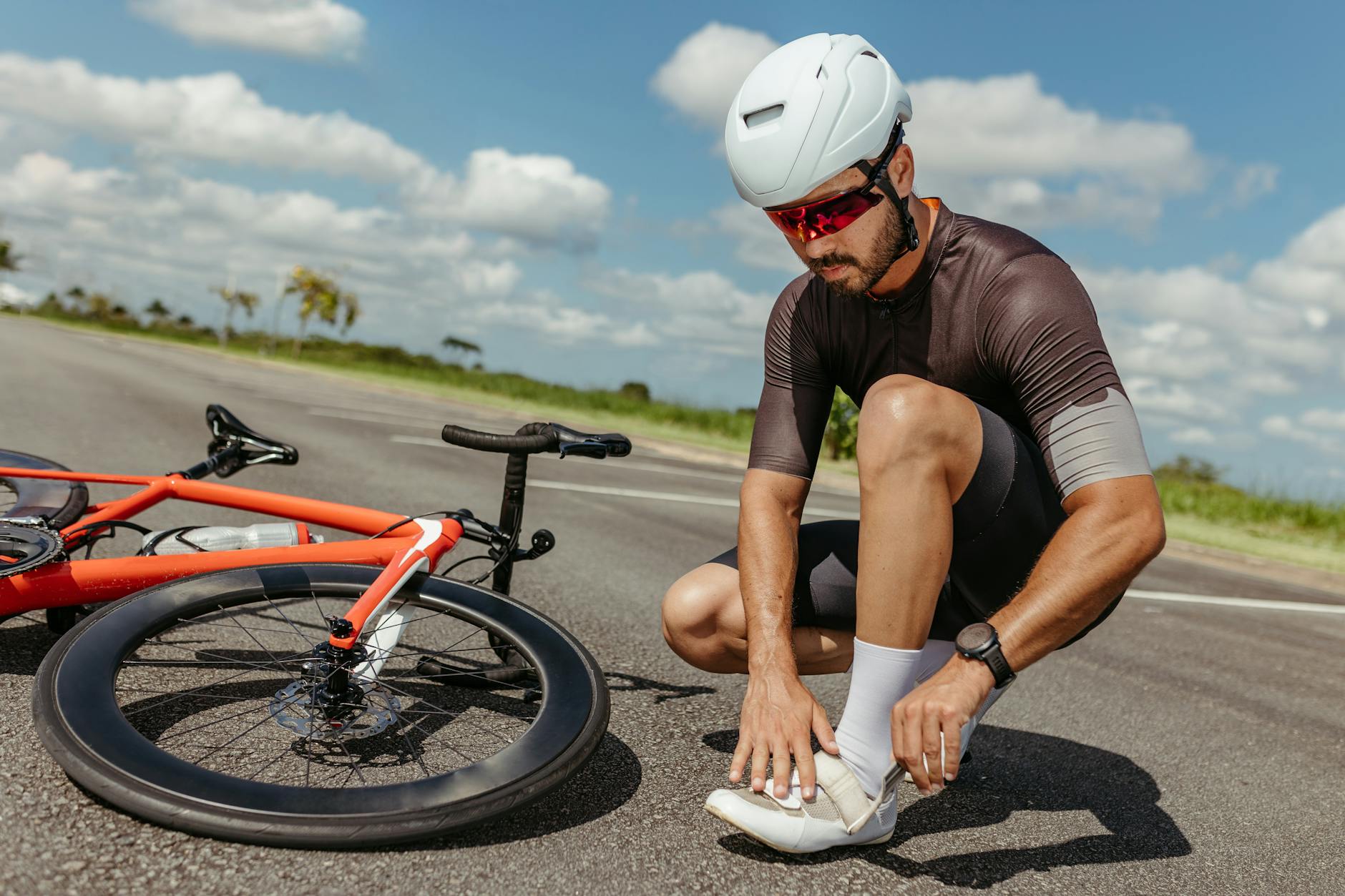Cycling enthusiasts, it’s time to shift gears and embrace the eco-friendly revolution in cycling apparel. While this article isn’t exclusively about sustainable clothing brands, it is an important part to understanding how to make eco friendly apparel choices.
Many brands are now crafting high-performance gear using recycled and sustainable fabrics, ensuring you can ride in style while caring for our planet.
Pactimo: Pedaling Towards Sustainability
Pactimo is leading the pack with over 60% of their product line incorporating recycled components. Their commitment to premium, high-performance recycled fabrics means you don’t have to compromise on quality or environmental responsibility. By choosing Pactimo, you’re supporting a brand that’s dedicated to reducing waste and promoting sustainability in cycling apparel.
ECOALF: Fashion Meets Function
ECOALF seamlessly blends fashion and sustainability. Their men’s cycling collection features organic, recycled, and vegan materials, minimizing the use of natural resources without sacrificing quality. With breathable fabrics like organic cotton, ECOALF ensures comfort and style go hand in hand on your rides.
Monton Sports: Eco-Friendly Innovation
Monton Sports is making waves with their eco-friendly cycling clothing made from recycled yarns. Their dedication to reducing the carbon footprint is evident in their stylish and functional designs. By opting for Monton Sports, you’re not only enhancing your cycling experience but also contributing to environmental preservation.
MAAP: Cutting-Edge Sustainability
MAAP utilizes Green Soul technology, combining 100% sustainable recycled fibers with environmentally friendly dyeing and finishing processes. Their high-quality, stylish apparel is crafted from post-consumer polyester and pre-consumer sustainable premium elastane recycled from industrial waste, offering both performance and peace of mind.
Presca: Waste Not, Want Not
Presca takes minimalism and sustainability to heart by using only recycled fabrics and fibers. Their products are made from waste resources like recycled plastic bottles and old fishing nets, turning trash into treasure. With recyclable or biodegradable packaging, Presca ensures your eco-friendly journey begins the moment you receive your gear.
Matchy: French Flair for the Planet
Founded in 2016, French brand Matchy focuses on creating sustainable cycling clothing. Their products are made from 30-100% recycled materials, contributing to a circular economy. Matchy’s commitment to eco-friendly practices allows you to ride with a touch of French elegance while supporting the environment.
LAMEDA: Summit Ride with a Conscience
LAMEDA’s Summit Ride Men’s Cycling Jersey is crafted from recycled fabric, offering features like high-stretch seams and 3D contouring. By choosing LAMEDA, you’re investing in gear that supports sustainable practices without compromising on performance.
Chic à Vélo: Timeless Sustainability
Chic à Vélo is dedicated to creating sustainable cycling clothing using responsible, organic, and natural fabrics. Their designs focus on timeless, functional, and durable pieces that feel great and have a lower environmental impact. With Chic à Vélo, you can ride in style while supporting ethical fashion.
Safetti: Revolutionizing Eco-Friendly Gear
Safetti stands out as a trailblazer in sustainable practices, community involvement, and employee well-being. Their high-quality, eco-friendly gear reflects a forward-thinking approach, ensuring you can ride with confidence and a clear conscience.
DannyShane: Bamboo for the Win
DannyShane incorporates eco-friendly bamboo white ash fabric into their cycling clothing, offering a unique blend of sustainability and performance. By choosing DannyShane, you’re embracing innovative materials that benefit both you and the environment.
Aerotech Designs: Recycled Performance
Aerotech Designs offers cycling apparel made with recycled polyester (rPET), providing strong, durable fabrics that perform just as well as non-recycled materials. Their commitment to ethical production ensures you can ride with gear that’s both high-quality and environmentally friendly.
Patagonia: Protecting Your Ride
Patagonia’s sustainable cycling clothing is made from materials like recycled plastic bottles, ensuring high-quality gear that reduces waste and supports eco-friendly practices. Their campaign to protect the places you ride helps keep the world’s best cycling spots free from environmental damage.
Triple2: German Engineering Meets Ecology
German company Triple2 is highly environment-oriented, offering cycling clothes made from sustainable materials. Their focus on eco-friendly practices ensures you can enjoy German engineering while supporting the planet.
Zyclism: Ocean Waste Transformation
Zyclism specializes in creating cycling apparel from ocean-waste materials, turning harmful pollutants into high-performance gear. By choosing Zyclism, you’re actively contributing to cleaner oceans and sustainable fashion.
Cima Coppi: Wool and Plant-Based Polyester
Cima Coppi offers cycling clothes handmade in Spain using wool and plant-based polyester. Their commitment to natural materials provides comfortable, eco-friendly options for your cycling adventures.
Isadore: Merino and Recycled Plastics
Isadore’s “Alternative” line features cycling apparel made from recycled plastics and merino wool, offering sustainable and high-performance options for eco-conscious cyclists.
Radiant Matter: Shimmering Sustainability
Radiant Matter creates biodegradable, shimmering BioSequins from cellulose, used by top designers like Stella McCartney. Their innovative approach adds a touch of glamour to sustainable fashion.
Solena Materials: AI-Designed Biodegradable Textiles
Solena Materials uses AI to design biodegradable proteins for durable, yet comfortable textiles, pushing the boundaries of sustainable fabric innovation.
Ponda: Eco-Friendly Jacket Filling
Ponda developed BioPuff, an eco-friendly jacket filling made from bulrush seedheads, offering a sustainable alternative to traditional synthetic fillings.
PulpaTronics: Recyclable RFID Tags
PulpaTronics produces recyclable, chip-free RFID tags from paper, reducing electronic waste in the fashion industry.
DyeRecycle: Removing Dyes for Recycling
DyeRecycle offers a solvent to remove dyes from textiles, facilitating effective recycling and reducing waste in the fashion industry.

Fair Fashion: Why Ethical Production Matters in Your Wardrobe
Ever wondered who made your clothes and under what conditions? Let’s unravel the threads of ethical production in the apparel industry and discover why fair labor practices should be the new black in your wardrobe.
The Human Cost of Fast Fashion
Picture this: a bustling garment factory where workers toil for long hours in unsafe conditions, earning barely enough to survive. Sadly, this is the reality for many in the fast fashion industry. Reports reveal that garment workers often endure unsafe conditions, wage theft, exhausting hours, minimal pay, and gender-based harassment. By supporting brands that prioritize fair labor practices, you’re taking a stand against these injustices and advocating for the well-being of workers worldwide.
Fair Wages: More Than Just Numbers
Imagine working tirelessly but still struggling to make ends meet. Unfortunately, less than 2% of garment workers earn a living wage. Fair labor practices ensure that workers receive wages that meet their basic needs, promoting economic stability and the well-being of working communities. When you choose ethically produced clothing, you’re contributing to a system that values and fairly compensates its workers.
Safe Working Conditions: A Basic Right
Everyone deserves a safe workplace. Yet, many garment workers face hazardous environments daily. Ethical production emphasizes the importance of safe working conditions, ensuring that employees are not exposed to unnecessary risks. By supporting brands committed to safety, you’re helping to create a fashion industry that values human life over profit.
Empowering Workers: Beyond the Factory Floor
Ethical production isn’t just about fair pay and safe conditions; it’s also about empowering workers. This includes respecting their rights to form unions, bargain collectively, and have a voice in their workplace. Such empowerment leads to a more motivated and satisfied workforce, which can enhance productivity and product quality.
Transparency: Knowing the Journey of Your Clothes
Have you ever thought about the journey your clothes take before reaching your closet? Ethical brands are transparent about their supply chains, allowing consumers to trace the origins of their garments. This transparency builds trust and ensures that brands are held accountable for their labor practices.
The Ripple Effect: How Your Choices Matter
Your purchasing decisions have power. By choosing ethically produced apparel, you’re sending a message to the industry that fair labor practices are important. This demand can lead to more brands adopting ethical practices, creating a ripple effect that can transform the industry.
Legislation and Advocacy: Pushing for Industry-Wide Change
Beyond individual choices, supporting legislation and advocacy efforts can lead to broader changes in the industry. For instance, initiatives like the Fashion Workers Act aim to offer models protections against exploitation, highlighting the importance of legal frameworks in promoting fair labor practices. Staying informed and supporting such efforts can amplify the push for ethical production.

Gear Up for Good: Choosing Durable Equipment to Reduce Waste
Hey there, eco-conscious adventurer! Ready to make your outdoor escapades more sustainable? Let’s dive into how selecting durable gear can help minimize environmental impact and keep our planet happy.
Why Durability Equals Sustainability
When you invest in high-quality, long-lasting gear, you’re not just saving money in the long run; you’re also reducing waste. Durable equipment means fewer replacements, which translates to less trash in landfills and a happier Earth. Plus, sturdy gear can withstand the rigors of your adventures, ensuring safety and reliability. But don’t just take our word for it give our carefully selected gear a go, we think you’ll appreciate their durability and reliability.
Material Matters: Opt for Sustainable Fabrics
Choosing gear made from sustainable materials is a win-win. Look for items crafted from recycled or organic fabrics, like recycled polyester or organic cotton. These materials lessen the need for virgin resources and often require less energy and water to produce. For instance, some brands utilize recycled materials in their products, reducing environmental impact without compromising quality.
Repair and Reuse: Extend Your Gear’s Lifespan
Before tossing out that slightly torn jacket or worn-out backpack, consider repairing it. Many companies offer repair services or sell replacement parts, allowing you to extend the life of your gear. Not only does this save you money, but it also keeps items out of landfills and reduces the demand for new resources.
Secondhand Scores: Embrace Pre-Loved Equipment
Buying used gear is another fantastic way to reduce waste. Thrift stores, online marketplaces, and specialized outdoor gear shops often have high-quality, gently used items at a fraction of the cost. By giving gear a second life, you’re preventing waste and promoting a circular economy.
Mindful Maintenance: Care for Your Gear
Proper care can significantly extend the lifespan of your equipment. Follow manufacturer guidelines for cleaning and storage, and use eco-friendly products when possible. For example, using non-toxic and biodegradable soaps to wash your sustainable hiking apparel and gear helps maintain their integrity while being kind to the environment.
Versatility is Key: Choose Multi-Functional Items
Opt for gear that serves multiple purposes. For example, a jersey that’s suitable for various weather conditions reduces the need for multiple items. Selecting the right cycling jersey enhances your comfort and elevates your overall riding experience. By understanding the features suited to different climates—be it the breathability needed for summer heat or the insulation required for winter chills—you equip yourself to tackle any ride with confidence. This approach not only saves space but also minimizes consumption and waste.
If you want to learn more about how to Choose the Perfect Cycling Jersey Click here!
Stay Informed: Research Brands and Their Practices
Before making a purchase, take the time to research brands and their sustainability practices. Look for companies that are transparent about their sourcing, manufacturing processes, and environmental commitments. Brands that publish sustainability reports or have certifications like Fair Trade or Bluesign® are typically more reliable.

Shifting Gears: Embracing Eco-Friendly Cycling Apparel
Hey there, fellow cyclist! Ready to make your rides greener and your wardrobe more sustainable? Let’s explore how you can transition to eco-friendly cycling wear without compromising on style or performance.
Why Go Green with Your Cycling Gear?
Sustainable fashion isn’t just a trend; it’s a commitment to reducing your environmental footprint. Traditional cycling clothes often rely on synthetic materials that contribute to pollution. By opting for eco-friendly alternatives, you’re supporting ethical production practices and promoting a healthier planet.
Click here to learn more about Sustainable Fashion.
Starting Small: Incorporate Eco-Friendly Pieces Gradually
You don’t have to overhaul your entire wardrobe overnight. Begin by adding a few sustainable items, like jerseys made from recycled materials or shorts crafted from organic fabrics. Brands such as Pactimo offer products using high-performance recycled fabrics, making it easier to find quality eco-friendly options.
Prioritize Durability: Invest in Long-Lasting Apparel
Sustainable clothing often boasts superior quality due to the emphasis on durable materials. Investing in long-lasting gear means fewer replacements and less waste over time. Look for brands that focus on durability and offer repair services to extend the life of your apparel.
Care for Your Gear: Maintenance Tips for Sustainability
Proper care extends the lifespan of your cycling apparel. Follow washing instructions carefully, avoid harsh detergents, and air-dry your clothes when possible. Some brands even offer repair services, ensuring your gear stays in top shape for longer.
Explore Second-Hand Options: Give Pre-Loved Gear a New Life
Consider purchasing second-hand cycling apparel or participating in gear swaps within your cycling community. This not only reduces waste but also allows you to find unique pieces with character. Plus, it’s a budget-friendly way to embrace sustainability.
Stay Informed: Keep Up with Sustainable Innovations
The world of sustainable fashion is ever-evolving. Stay updated on new materials, technologies, and brands that prioritize eco-friendly practices. Engaging with online forums, reading blogs, and following eco-conscious influencers can provide valuable insights and recommendations.




